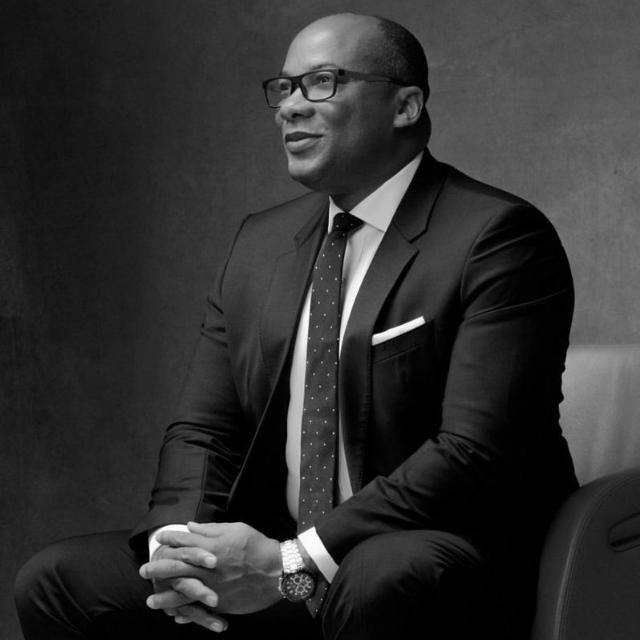While all men may be equal, in the world of electronic payments, one man’s achievements in particular stand out – Mitchell Elegbe.
You will struggle to find a Nigerian that uses any form of e-payment service that is not connected to him or his brain child, Interswitch – an idea he devised as a young engineer to revamp Nigeria’s payment system and make life easier for all, by making financial transactions, mostly, cashless.
An Electrical Engineer from the University of Benin, Nigeria, Mitchell founded Interswitch in 2002 inspired by an encounter with an ATM seizing his card in Scotland.
Founded in Nigeria, Interswitch started operations as a transaction switching and electronic payments processing company that builds and manages payment infrastructure to digitize the country’s then predominantly paper-ledger and cash-based economy.
Within two years, Interswitch won a gold medal for innovation at the Computerworld Honors, an international award program which recognizes individuals and organizations whose achievements in ICT have impacted society. Before receiving the award, the company had seven local banks on its network.
READ ALSO: See 10 Richest Royal Families in the World and their Worth
Thereafter, the number increased to 13, and the first set of non-banks, including an ATM consortium and Globacom, a mobile telecommunications provider, were added.
In 2009, the company launched Verve, which has become the most used payment card in Nigeria. Verve has also been launched in Kenya and has since gone global.
In 2010, Interswitch introduced Quickteller, an online payments platform that can be accessed through a wide array of digital and physical channels. Quickteller currently boasts over 15 million users.
Eight years after it was set up, Interswitch’s shareholders collectively came to a decision to alter the ownership model of the business. With the company valued at over US$170 million, a private equity deal was agreed, and two-thirds of the company was sold to an investment consortium.
The equity injection bolstered Interswitch’s balance sheet and paved the way for it to begin realizing its ambition for the continent, which was soon reflected by its acquisition of Bankom, Uganda’s leading transaction switching company.
Today, Nigerian consumers and businesses make more than 300 million digital transactions every month via a suite of channels enabled by Interswitch.
Beyond the shores of Nigeria, Interswitch has a physical presence in Uganda, Gambia, and Kenya where it has completed several high-profile acquisitions. The company also sells its products in at least 23 African countries, currently through bank partnerships.
Today, the company provides most of the rails for Nigeria’s online banking system that serves Africa’s largest economy and population. Interswitch offers a number of personal and business finance products, including its Verve payment cards and Quickteller payment app.
Interswitch stands at the forefront of digital payment in Africa with over 270 other players across Africa building infrastructure on a super-highway laid out by Interswitch, leveraging its platform to drive their business objectives and deliver value to their customers.
READ ALSO: ASUU Strike: Parody Account Advices Undergraduates to Learn a Skill
Now a truly Pan-African company, it provides technology integration, advisory support, transaction processing and payment infrastructure services to governments, banks and corporate organisations and high-net worth individuals on the continent.
In November 2019, Interswitch attained the coveted ‘unicorn’ status after Visa acquired a significant minority stake in the firm making it one of the most valuable African fintech businesses with a valuation of more than US$1 billion.
Today, Interswitch maintains connectivity to all commercial banks across Nigeria as well as over 100 financial institutions, and continues to work with international partners such as Discover Financial Services, American Express, MasterCard and UnionPay, as the firm focuses on making payments more seamless, not just in Nigeria, but across the continent.
The partnership with American Express earlier this year, brought Interswitch’s merchants into the global American Express network and made its cards more relevant to its users by leveraging Interswitch’s platforms and to broaden acceptance of Amex Cards in Nigeria.
Alliances have been, and remain, an important part of the company’s growth. Visa, Discover, and American Express are just some of its strategic partners who share a common vision in with Interswitch, looking to replicate what the company has been able to achieve in Nigeria across other African markets.
Continuing its growth, in September 2019, Interswitch, acquired a 60% stake in E’clat Healthcare Limited (E’clat), a health technology company providing electronic primary healthcare services. E’clat , through its proprietary software, provides electronic and wireless primary healthcare services to a number of hospitals, state governments and primary health care centres in Nigeria.
The decision to buy E’clat aligns with Mitchell’s belief that there is an essential need for more private sector influence and thinking in public-sector policy and implementation across Africa.
Mitchell has therefore, asserted his intent to continue to collaborate with the public sector and offer his experience and expertise in public sector service, in addition to bringing to life the vision of launching an entrepreneurial trust – a project which he has long had in development – underscored by deep passion to develop the next generation of African entrepreneurs.
His desire to leave his mark on the African business landscape, with technology and human capital development as his instrument, has fuelled the vision that has led what ‘Interswitch’ is today. Mitchell is firmly of the belief that leadership creates opportunities to help shape a new generation but also to create a better vision of tomorrow.
So it is no wonder why he visualizes an evolution of his current responsibilities into additional roles where he can lend his years of experience and expertise in business, to support and advise the public sector, not wholly ruling out the possibility of someday getting more actively involved in public service leadership.
With the successes and milestones Mitchell has been able to achieve to date, it is no surprise that he continues to set aspirations far and wide.













